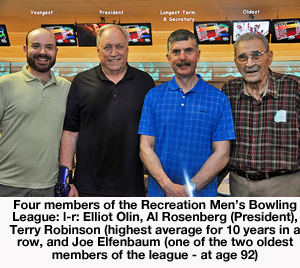Local News
Winnipeg’s last Jewish men’s bowling league celebrates 100 years of camaraderie and friendly competition
 By MYRON LOVE On June 15, the Recreation Men’s Bowling League held its annual wind-up banquet at the Glendale Golf & Country Club. As per usual, the wind-up is the venue for handing out the awards for the year just past.Once again, for the tenth year in a row, Terry Robinson won the W. Harry Zimmerman Memorial Trophy for Highest Average, a feat that the largely Jewish Recreation Men’s Bowling League’s current secretary has achieved for 16 of the past 20 years.
By MYRON LOVE On June 15, the Recreation Men’s Bowling League held its annual wind-up banquet at the Glendale Golf & Country Club. As per usual, the wind-up is the venue for handing out the awards for the year just past.Once again, for the tenth year in a row, Terry Robinson won the W. Harry Zimmerman Memorial Trophy for Highest Average, a feat that the largely Jewish Recreation Men’s Bowling League’s current secretary has achieved for 16 of the past 20 years.
The Norm Lachter Memorial Trophy for sportsmanship was awarded to league treasurer Harvey Appelle for the fourth time – one more than Robinson.
Art Greenspan was recognized with the Jacob Memorial Trophy for most improved bowler.
Among the team awards, Robinson’s team (including Chad Selk, Andrew Feniuk, Sam Binder and Gary Verin) won the Larry Rosenberg Memorial Trophy (Aggregate Team Winner); the Spigelman Team (Avery Spigelman, Aaron London, Evan, Roitenberg, Sheldon Zipursky, Danny Gunn and Stu Slayen) received the Joseph Kay Memorial Trophy (A Roll-Off Team Winner); and Magorel Team (Garry Magorel, Saul Greenberg, Frank Dahl, Mel Verin and Brian Greenberg) earned the Sam Greenspan Memorial Trophy (B Roll-off Team Winner).
Robinson notes that the league currently consists of eight teams with five bowlers per team – a number that has remained fairly consistent over recent years – with members ranging in age from 18 to 92 (the oldest members being Joe Elfenbaum and Rube Helman). The men bowl at Chateau Lanes Wednesday evenings from the beginning of September through April.
The league itself is part of the Manitoba Tenpin Bowling Association.
Bowling has been a popular pastime in our Jewish community as long as bowling alleys have existed here. Several members of our community have had leadership roles in the sport over the past 100 years. The most impactful was the late Harry Zimmerman.
The businessman served as Secretary-Treasurer of the Manitoba Ten Pin Association for 36 years – from 1927 to his death in 1963 – and also treasurer of the Winnipeg Bowling Association for 21 years from 1942 to 1963. He was instrumental in the organizing of 5 Pin Bowling in Winnipeg. As well, he organized an annual high school tournament in the city of Winnipeg to introduce the sport to new members.
In his listing in the Manitoba Bowling hall of Fame (he was inducted in 1989) it is noted that “even in the lean years when the sport had only one house in addition to the clubs, Zimmerman never despaired and showed great optimism for the future.
Nate Lexier, who was inducted into the Hall of Fame in 1990, may have been the finest bowler Winnipeg has ever produced – according to the Hall of Fame citation. During a career that spanned 50 years – starting in 1932 when he was 13 – he averaged a score of 200 or better for seven consecutive seasons and was a member of the Senior League Championship Team eight times.
He also served on the Winnipeg Bowling Association for 14 years, including 11 seasons as President from 1942 – 53.
Of more recent vintage have been Elaine Yamron and Harvey Zimberg. Both have been leaders in the world of bowling locally, nationally and internationally – for 50 years, beginning in the early 1970s. Yamron even competed for Canada at the 2001 Maccabi Games.
Over the decades, there have been several different Jewish bowling leagues – with board members and scores posted weekly in what was formerly The Jewish Post – in the club and social news section – and, in more recent years, at the end of Harvey Rosen’s sports columns.
In the April, 19th, 1951 edition, for example, in the paper, there is a report on the results for the Bnai Brith Ten Pin league bowling results for March 3.
In 1961, one can find details on the Classic Ten-Pin League as well as B’nai Brith Ten-Pin Bowling, in addition to the Recreation Ten-Pin league.
In 1978, the Post reported the scores of 12 Jewish bowling leagues – men’s women’s and mixed. In 2001, there were Post reports on the Gateway Mixed Bowling league, Jewish Women’s International League and Recreation League.
Terry Robinson is the longest serving member of the Recreation League. “I have been bowling for 47 years,” says the grandson of Sydney I. Robinson, who worked in the sporting goods industry for most of his career. “My father was a bowler. Just after I got married in 1975, my dad let me know that there was an opening in the league and invited me to join.”
Saul London and his wife, Caroline, started bowling together more than 30 years ago in a league with many Jewish members who bowled Sunday evenings in the basement of the German Club. When that league folded, the retired accountant joined the Recreation League.
For many years, London was the Recreation League’s secretary and the individual who sent in the regular results to what was by then The Jewish Post & News.
At the time London joined, he recalls, the league was bowling at Empress Lanes. When that bowling alley closed, the men moved to Chateau Lanes – where they currently bowl.
Al Rosenberg has been president of the Recreation League for the past eight years. The businessman (advertising and marketing) was recruited by London.
“Mel Verin , who was one of my best friends, was also a member,” Rosenberg says. “I really enjoy the camaraderie.”
Robinson also comments on the social experience. “We have a really good group of guys,” he observes. “I also enjoy the competitive aspect.”
Harvey Appelle, the League’s long time treasurer, reports that while the number of League bowlers is not quite what it was – there used to be almost 50 participants – the group has been able to retain 40 for several years now.
He laments though that the league membership is getting older. Robinson agrees that it would be nice to be able to attract a few more younger bowlers.
“It’s understandable though that younger people would prefer to bowl with their friends,” he observes.
Nonetheless, all the League participants are eager to get going this month for the Recreation League’s 101st season.
Local News
Cheryl Hirsch Katz, Jewish Child and Family Service’s longest serving staffer, set to retire at end of the month

By MYRON LOVE “I loved working at Jewish Child and Family Service,” says Cheryl Hirsh Katz, who is due to retire at the end of June. “I have always appreciated the warm and welcoming atmosphere here. I feel that the people working here are my extended family. I am going to miss my colleagues”.
“I have derived great satisfaction over the years to have been able to help many people in our community of all ages through my work at JCFS,” she continues.
After 44 years at the agency, Katz, the longest-serving member of the staff, was given an appreciative send-off at the JCFS’s recent (June 23) Annual General Meeting at the Shaarey Zedek Synagogue.
The daughter of Art and Bess Hirsh, Cheryl grew up in Garden City. She attended Peretz School, then Jefferson Junior High and Garden City Collegiate. She joined the staff of JCFS in 1981, shortly after receiving her Bachelor of Social Work degree.
She earned an MSW in 1990.
“I chose to become a social worker,” she recalls, “because I always wanted to be able to help people.”
Katz was originally hired by JCFS to work with newcomers. After a couple of years, she was given responsibility for looking after the needs of older adults.
“I really enjoyed working in older adult services,” she says. “That is where I spent the bulk of my time at JCFS.”
After ten years as a case worker, she was promoted to a supervisory role. Later, she was also given responsibility for mental health and addictions programming and settlement services, while keeping the older adult files under her purview.
“As a supervisor, I wasn’t directly involved with individual clients,” she points out. “I was more involved with programming. Among the programs for seniors we organized were – for example – sessions on elder abuse, digital storytelling and memory loss.”
She notes that one of the trends she has seen over the last 44 years is that people are living longer and living in their homes longer. A lot more of our clients are living well into their 90s,” she observes. “We have had to continually expand our staff and the services we provide in order to accommodate the growing demands of an aging population.”
She also spoke of the mental health needs of seniors and aging Holocaust survivors.
She says that she has mixed feelings about leaving JCFS. “After so many years working full time, I am going to have to create a new routine,” she comments.
She notes that, now that she is retired, she will have more time to spend with her parents – who are in their 90s.
And then, there are the two dogs to look after. “I will have time now to try new activities,” she says. “ I might learn to play mah-jong.”
She speaks about maybe doing some traveling – although her husband, Murray, is still working full time.
(She and Murray have one daughter, Farah.)
“Retirement may also include some volunteering,” she adds.
It is quite likely, she will be continuing her association with JCFS but in a volunteer capacity.
Local News
Gray Academy students shine in provincial, national debating competitions

By MYRON LOVE It has been another good year for Gray Academy’s high school students who participated in provincial and national debating competitions. The best results were recorded by Grade 9 student Noa Mednikov, who finished fourth overall nationally, fourth in interpretive reading, and fifth in persuasive speaking at the junior National Public Speaking Championship in early May in Vancouver.
Last October, in the Junior Provincial British Parliamentary Championship – which was held at St. John’s-Ravenscourt – Noa and her partner, Raya Braunstein, finished third as a team while Raya placed third in individual debating.
Their fellow Grade 9 student Maxim Moscalenkov tied for first in persuasive speaking in Vancouver, while the Gray Academy team of Gabe Tapper and Aaron Koplovich finished fifth. Aaron also finished fifth in his individual debate.
Earlier, in March, Maxim finished fifth in the Provincial Juniors debating competition, which was held at Balmoral Hall He and his debate partner, Nate Shenkarow, finished seventh among the teams entered. Last November, he and partner, Ethan Tenenbein, finished seventh in the Junior Prepared Tournament – just behind the Gray Academy team of Nate Shenkarow and Jack Kay.
At the senior high level in that competition, the team of Jacob Tenenbein and Jonah Novoseller finished fourth and Jacob was recognized as fifth best in an individual capacity. Jonah and Jacob also paired up to win the Asper Cup, which was held at their home school.
Jacob represented Manitoba at the Junior National Speech Championship in Vancouver in May and, last October, he and Grade 12 Gray Academy students Julie Krozkin and Daniel Bokser represented Canada at an international debating tournament in Bermuda.
Gray Academy’s debating program was introduced by Linda Martin in 2003. She also led the debating teams at Balmoral Hall. In 2011, Martin was succeeded by Gray Academy high school English teacher Andrew Kaplan.
“Andrew has done a wonderful job with the debating program” says Martin, who has a debating trophy at Gray Academy named in her honour, as well as a provincial trophy for best individual junior debater. “Over the years, Gray Academy students have done very well in many local, national and international competitions,” she adds.
About three weeks ago, this writer had the opportunity to sit down with Andrew Kaplan and six of the school’s top debaters while they discussed the benefits of learning how to debate. According to Noah Strauss – who competed in the Junior Provincials at Balmoral Hall in March, public speaking leaves him with a feeling of accomplishment.
“It’s a good skill set to have,” he observes. “It builds confidence.”
“A benefit of being able to debate is that you learn how to convince people that you know what you are talking about,” adds Maxim Moscolenkov.
Raya Braunstein notes that being able to debate is a skill that she expects to be helpful in many university courses which she may choose to take.
As Andrew Kaplan notes, the ability to express yourself has a great impact in whatever career you choose to pursue.
He points out that debating is compulsory at Gray Academy for all Grade 7 and 8 students – and students can continue debating as an option in the higher grades
Of course, competitive debating is not for everyone. For those students who opt to take that path, the journey begins with internal school debate competition – with the top debating teams and individuals qualifying for local tournaments and – potentially – beyond.
Andrew Kaplan reports that a small number of high schools in Winnipeg and southern Manitoba have active debating programs – including St. Johns Ravenscourt, St. Paul’s High School, St. Mary’s Academy, Garden City and Maples Collegiates in the Seven Oaks School Division, St. Maurice (a Catholic School), as well as Morden Collegiate and Dasmesh, a Sikh private school.
Kaplan expresses his appreciation to the Asper Foundation and an endowment spearheaded by the Kives Family for providing funding for the Gray Academy debating program – as well as the Andrew Slough Foundation – which was established by his friends in memory of the outstanding former Ravenscourt student debater and lawyer who passed away suddenly two years ago at the still young age of 38.
I am confident that our Jewish community can look forward to the continued success of Gray Academy’s star debaters and to the continual emergence of future stars as the times goes by.
Local News
Antisemitism has crept into grade school in Canada

Antisemitism in Canada has moved beyond protests and politics; it is now entering classrooms and altering how Jewish children see themselves functioning within them.
A a university student I have observed the experience of my younger brother in grade eight as a Jewish student. Over the past few months, his school has been at the center of several deeply troubling incidents that have made him feel unsafe in our parks, community, and even his school. Swastikas were drawn around the community, in parks and ponds. Additionally, an older man, who claims to be a pro-Palestinian influencer, stood outside his predominantly Jewish school wearing a keffiyeh, filming a video which then circulated between students on TikTok.
This same man later showed up to our local Jewish community center in keffiyeh to allegedly watch his son play basketball where my brother and many of his classmates go for their lessons, basketball games, and Jewish events. These moments made him and his peers feel watched and targeted just for being Jewish. Local political representatives condemned the incidents and raised awareness about antisemitism, but the fear among students didn’t go away. The feeling of being targeted for simply existing has been taught to my brother, something my parents had tried their hardest to escape from.
Most recently, my brother was chosen to represent his school at a regional science fair. When one of the judges arrived wearing a keffiyeh, he froze. For many, including my brother after the incidents he has faced, the keffiyeh represents a political message. But even more so for my younger brother, it is tied to the fear and intimidation he had already experienced. He felt nervous, distracted, and unsure of how to act.
This is not about silencing political expression. It is about a child who came to share his ideas and left feeling uncertain and afraid. It is about the atmosphere forming in Canadian schools, where Jewish students are being made to feel targeted and unwelcome.
His school made an effort to address the incidents, but the impact is lasting. Posts on social media, much can be very vague at times about inclusion cannot fully undo the feeling of being singled out. A kind word from a teacher does not erase the fear that builds when threats are left unspoken but deeply felt.
I am writing this as a sister who watched her younger brother lose a moment that should have been filled with confidence and pride. He deserved to feel safe. So do all Jewish students in this country.
Moving forward, schools must take concrete steps to protect all students. Antisemitism cannot only be addressed when it becomes violent or overt. It must also be recognized when it appears as intimidation, symbolic targeting, or political messaging that creates fear among students. Children should never have to question whether they are safe in their own classrooms or community spaces.
Events that are meant to support and celebrate students must remain focused on them. Individuals who feel the need to bring political symbols or messages into school grounds or children’s events should not be welcomed in those spaces. Schools must make it clear that their environments exist to support learning, safety, and inclusion, not to host agendas that can intimidate or isolate students.
Administrators and educators must develop clear guidelines for identifying and responding to antisemitic behavior in all its forms. This includes strengthening security measures, offering ongoing staff training, and engaging directly with Jewish families to understand their concerns. Inclusion is not a one-time statement. It is a responsibility that must be reflected in everyday decisions and actions. No child should ever feel unsafe or unwelcome because of their identity.
The author is a Campus Media Fellow with HonestReporting Canada and Allied Voices for Israel who lives in Toronto.
